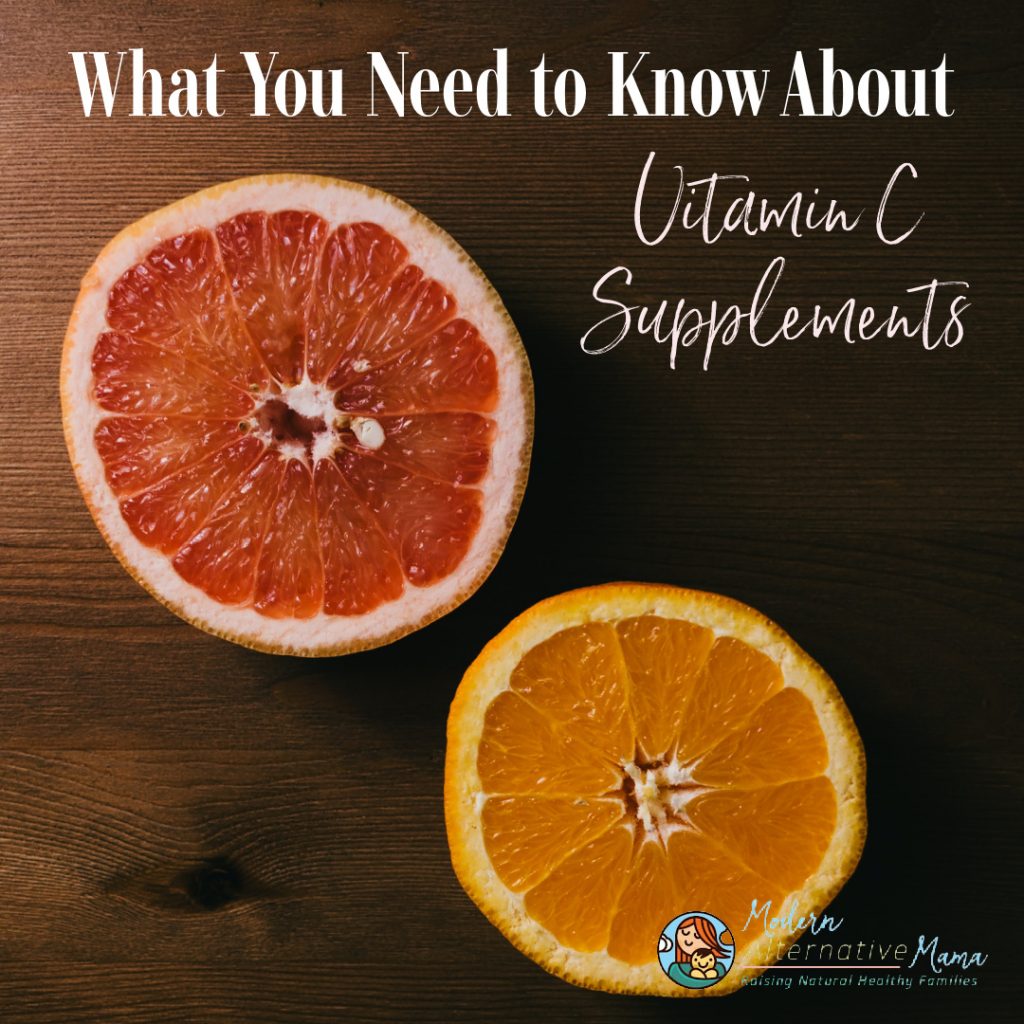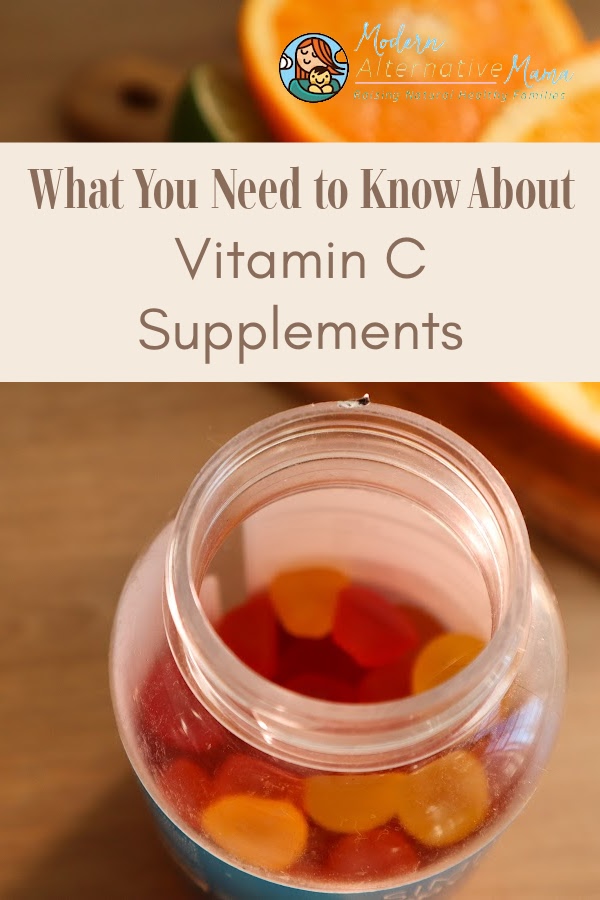I probably spend far too much time reading about different vitamins and minerals.
After all, they’re what makes us tick — quite literally. Vitamins and minerals are required for our bodies to perform all essential functions, like our hearts beating and our muscles moving.
Vitamin C is one that’s on many peoples’ radar, because it’s purported to help with detox (it’s a powerful antioxidant) and to help fight the common cold.
Key Facts About Vitamin C
Benefits of Vitamin C:
- May shorten and reduce severity of common colds (source)
- Promotes healthy blood pressure levels (source)
- May reduce blood uric acid levels (to prevent gout) (source)
- Supports heart health (source)
- Promotes healthy cholesterol levels (source)
- May reduce levels oxidative stress (source)
- Supports proper iron absorption (source)
- Improves allergy-related symptoms (source)
- May protect skin from UV sun damage (source)
- Improves signs of skin aging (source)
- Promotes collagen formation (source)
- May improve skin hyperpigmentation (source)
Symptoms of Vitamin C deficiency (source):
- Poor immune system function (source, source)
- Low iron (source) or Anemia (source)
- Unexplained weight gain (source)
- Mental and physical fatigue (source)
- Inflammation and oxidative stress (source)
- Bleeding gums and periodontal disease (source)
- Skin diseases like atopic dermatitis (source)
- Spoon-shaped fingernails (source)
- Hair and skin abnormalities (source)
Risk factors for Vitamin C deficiency include (source):
- Restrictive diets or food allergies (lack of fruit and vegetable consumption)
- GI tract disorders like IBS (inflammatory bowel disease).
- Iron overload (this leads to wasting of vitamin C by the kidneys)
- Alcoholism
- Babies only fed cow’s milk
- Smokers
- Eating disorders
- Type 1 diabetes who have high vitamin C requirements
Vitamin C is clearly beneficial, so how do you increase your intake?
The typical vitamin C supplements at stores, though, use isolated ascorbic acid — derived from fermented GMO corn or metabolically engineered yeast strains (source). (Take a whole bunch and watch what happens — your pee will be neon yellow and it might give you diarrhea.)
That begs the all-important question: what is the best type of vitamin C, and how do you get it?
Common Forms of Vitamin C
The most common form of vitamin C is ascorbic acid. That is the proper chemical form of vitamin C — the actual stripped-down, isolated molecule. Most vitamin C supplements are in this form, and are synthetic.
There is also sodium ascorbate. This essentially is sodium bonded with ascorbic acid. Vitamin C is actually used by the body by special sodium-dependent transporters, so the general theory is that pairing it with sodium increases absorption. This, too, is usually synthetic.
There is also calcium ascorbate, also known as ester-C. Some say this is better absorbed than ascorbic acid, and gentler on the stomach.
And, less commonly, there is liposomal vitamin C. This is essentially mixing a form of lecithin with vitamin C, which makes it fat-soluble and is supposed to increase absorption. (Usually it is soy lecithin bonded with ascorbic acid, synthetic. Sometimes it is sunflower lecithin.) Many people claim that this is the best therapeutic type.
The other types of vitamin C are mostly food-based. They’re ascorbic acid, too, but they come with a number of naturally-occurring other vitamins, minerals, and flavonoids. Research shows synthetic and food-derived variations of vitamin C are chemically identical, but it’s thought that vitamin C is better absorbed when consumed with its naturally-occurring co-factors, macro/micronutrients, and phytochemicals.
Choosing a Vitamin C Supplement
It definitely is true, however, that most synthetic supplements come with all kinds of artificial flavors, colors, and fillers — and these are not beneficial to health, and may be detrimental.
One popular type of “acerola chewable C tablets” contains:
Sucrose, Sorbitol, Fructose, Ascorbic Acid, Vegetable Cellulose, Sodium Ascorbate, Natural Flavors, Vegetable Stearic Acid, Citric Acid, Citrus Bioflavonoid Complex, Carrageenan, Raspberry Puree, Silica, Buckwheat, Vegetable Magnesium Stearate, Stevia Extract, Acerola, Rutin, Rose Hips, Hesperidin Complex, Black Currant Powder, Green Pepper Powder.
Several of those ingredients are not healthy — sucrose (sugar, likely from GMO sugar beets), sorbitol (artificial sweetener), stearic acid, carrageenan, and others. There’s good here, too; lots of plant extracts and bioflavonoids.
When choosing a healthy vitamin C supplement, it’s important to look for one that doesn’t contain these flavors and fillers and to find one that does contain bioflavonoids.
Most of these types of vitamin C will be based on food, including camu camu, acerola, rose hips, and other berries. (The first three that I named are the highest in vitamin C.)
Ingredients to look for:
- Camu camu (source, source)
- Acerola (source)
- Orange peel (source, source)
- Rosehips (source)
- Bioflavonoids (source)
Ingredients to avoid (learn more here):
- Sucrose
- Sucralose (Splenda)
- Stearic acid
- Artificial flavors
- Artificial colors
- Carrageenan
- Vegetable Magnesium Stearate
Most supplements that claim to be clean/natural (allergen-free), are not really that natural. This is true of most products, which is why I often don’t buy things that are pre-made…including supplements. But, of course, sometimes it’s just easier.
Earthley’s Immune-Aid Vitamin C Powder
This supplement is a combination of camu camu and acerola berry powders, which are the two highest vitamin C sources available. It also includes orange peel, another good vitamin C source, and whole powdered stevia leaf (for taste). There is also a capsule option (no stevia) for extra convenience.
Creating a whole foods vitamin C supplement was important to me – using plants that naturally contain the nutrient (plus a bunch of other naturally-occurring nutrients and benefits) was the obvious way to go!
A single teaspoon contains approximately 375 mg of vitamin C. A 4 oz. bottle costs just $19.99.
This powder has no additives, fillers, colors, or flavors. It’s pure, 100% food. Learn more here.
There are a few other brands that are also truly free of all of the junk that make clean options for anyone who has an allergy or preference for different ingredients. Main point to look for in your supplement is whether or not it’s made of clean whole-food ingredients (without extra fillers). Whole food options provide all the beneficial cofactors present in natural foods.
Vitamin C Dosing
Once you’ve chosen your vitamin C supplement, how much should you be taking?
This study says that doses greater than 200 mg at a time are not absorbed, so it’s much better to take smaller doses throughout the day.
One study suggests that the optimum daily dose is between 250 mg and 4000 mg a day. (The RDA, as they clearly note, is the minimum amount required to prevent scurvy, but not the actual necessary amount for optimal health. That is true of all nutrients and their RDAs.) This much more recent study suggests that 200 mg per day is optimum.
Another study suggests that higher-dose vitamin C (1250 mg) for a relatively short term (8 weeks, in this study) was beneficial, especially to those with more physical stress, like smoking.
Most agree that anywhere from 200 – 1000 mg a day is optimal, depending on your needs. Children should start on the lower end (or even possibly lower than that; around 100 mg/day), and adults can take extra, especially those with chronic illness.
Be aware that although the body excretes the vitamin C it doesn’t need (common when you take large doses at once), long-term high amounts can cause imbalances in nutrients. Vitamin C antagonizes (that is, prevents the absorption of) copper, calcium, manganese.
Those with type II diabetes, both high estrogen and estrogen deficiency issues, anemia, may especially benefit from vitamin C supplementation. Individuals with kidney issues need to be cautious with C supplementation as research indicates (for men, especially) that high doses of vitamin C supplementation may increase risk of developing kidney stones.
I would personally start with children at 100 mg/day, and adults between 250 and 500 mg/day (spread over 2 – 3 doses).
Do you take vitamin C? Why or why not?
**Steph Sinclair contributed to this post.**








I take 1000 mg per day. It is the ONLY thing that helps my chronic asthma. If my asthma does act up, I increase my daily dosage to 1500 – 2000 mg for a few days. I thank God I discovered this asthma/allergy treatment
Hi.
I enjoyed reading your article and am very interested in the best form of vitamin C for absorption in the body. My child(5) is severely anemic and I totally dislike “fake” pills (as in MD’s Rx). So, even if I give my child iron, she needs good vitamin C for her to absorb the iron.
I’ve been giving her “Dynamic Health Laboratories Inc Vitamin C 1000 8 Oz” but wonder if is a good choice or not.
Please provide your input if you can/know
Thanks
Hi Adriana,
I’m not familiar with that particular brand. I tend to use acerola berry powder, camu camu powder, or rosehips, which are all natural sources of vitamin C. Hope that helps!
Thanks for sharing, Sydney!
Excellent, well researched article. The acerola berry powder I typically buy just went from $60 per lb to $100 per pound! I wasn’t aware of the freeze dried option, but I am definitely switching to that brand. I can’t believe you have 5 kids! You look 13 in your pics – and that’s a good thing. Lol
I concur with Puckles, well researched article. I’ll follow your guidance on Vitamin C supplementation and the natural sources to target.
Hi Kate,
Great summary about Vitamin C. I use camu camu and liposomal Vitamin C for me; and 1/4 tsp. in juice for my 2 kids.
[…] you decide to try the oral supplement route, there are a lot of different types of Vitamin C supplements. A lot of them are food related, helping you load up on […]
Is it possible that some brands of lipisomal c have ingredients from China? Can you state which ones definitely don’t? Thanks,
stevemacmillan@att.net
Wonderful article and great information. Just what I was seeking. Thank you for posting and especially regarding asthma. Three of our children, now grown, have difficulty at times. I started taking copious amounts of vitamin c myself to chase away cold symptoms last year and found it worked only by taking loads. Then my husband, being a physician said he’d read of a doctor’s study saying 4,000 mg recommended to help immune system. But 5,000 Ok I’d really battling. I don’t take that much because less does the trick. People don’t believe me when I tell them about all the great benefits of increasing vit. C to ward if illness. Thank you again for the affirmation.
For severely anemic child, check out Morley Robbins, Root Cause Protocol. Very interesting spin on Magnesium, Copper and Iron. Says anemia is mis-diagnosis. Best wishes to you.
I purchased the Pure Radiance Vit C and a Dr that has done research on it says it is processed at a high heat which distroys the whole vit. C molecule. It failed the test so I threw it away.
Is buffered vitamin C gentler for those with acid reflux and for those who take large amounts of C? What is buffered vitamin C? Are any of the types you suggested buffered?
[…] be avoided by taking it in lower does throughout the day rather than a megadose all at once. See this article on preferred forms of vitamin […]
Hello, I found a wrong spelled thing, “Love our content? Sigh for our weekly newsletter and get our FREE Vaccine Guide!”
It should be Sign not Sigh should it not.
You have a very informative web page that also have some depth.